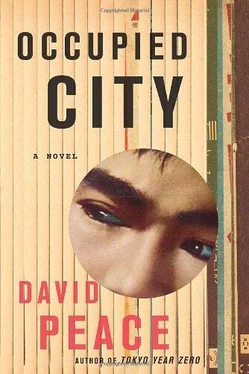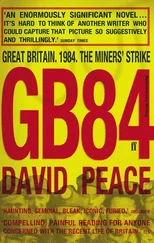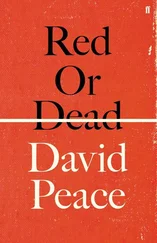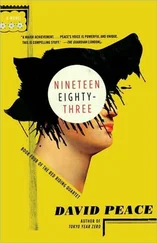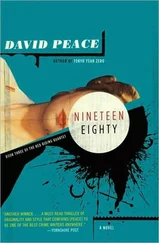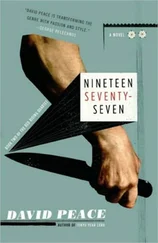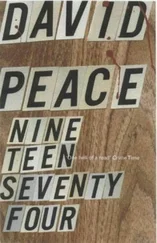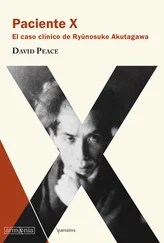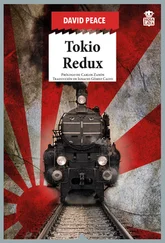Everyone is dying, everything is dying / The moment of birth is the beginning of decay / Decay then disease, disease then death / Birth manufactures disease, birth manufactures death / The body manufactures disease, the body manufactures death / There is only disease, there is only death
In the Death Factory, I stepped out of the building, back into the street. An ordinary street in Occupied China, with restaurants and shops, women chattering and children playing. I walked down the street, back the way I had come. Then I saw the two men from the Tokumu Kikan walking towards me, but they did not stop, they did not acknowledge me. They pulled down their hats and they pushed straight past me, walking briskly on, up the street towards the bank. I did not look back again. I glanced at my watch and I set off walking down the street again. Then, suddenly, at the first crossroads, a car pulled up. A man jumped out of the front passenger seat and held open the back door. ‘Let’s go,’ he whispered. ‘Your work is done here. It’s all over now.’ And I got into the back seat of their car, always, already a killer.
On the Black Ship, back in Chiba Prefecture, out on the highway, visitors come to the Dog Hospital now. Visitors on foot, then visitors in jeeps. Visitors with brown eyes, then visitors with blue eyes. But the Killer is not at his work, the Killer is not in his room. The Killer has gone.
In the ninth year of the reign of the Emperor Taishō / The student becomes a doctor, the doctor becomes a soldier / In the fractured, splintered mirror, the uniform changes but the work continues / Collecting and cataloguing, examining and experimenting / In the seventh year of the reign of the Emperor Shōwa / In the fractured, splintered mirror, the Army Surgeon is posted to Pingfan, near Harbin, in Manchuria
In the Death Factory, in June 1945, there were celebrations to mark the anniversary of the founding of Unit 731, but many of us already sensed the end was drawing near. There were many debates among us as to whether or not the Soviets would break the non-aggression pact and attack. Many of us felt that they would and we would be forced to evacuate the complex. Of course, such conversations could only be held in private as they were deemed defeatist and the punishments for such attitudes were harsh. However, we all knew that branch units that had recently been sent to the border had not returned.
Finally, the end came. At morning muster on 9 August 1945, all the members of Unit 731 were told that the Soviet Union had begun their invasion and we were ordered to destroy any personal documentation or evidence on our persons which would identify us as being members of Unit 731. All the men and their families were then issued with potassium cyanide. I was told that one of my responsibilities in the Examination and Treatment Unit would be to ‘assist in the deaths of those who were unable to commit suicide themselves’. To this end, our division was given extra quantities of potassium cyanide and also two large bottles of acetone cyanohydrin. It smelt of bitter almonds. I had smelt it before. And I would smell it again. In the end, however, an evacuation order was given. I was then reassigned and detailed to participate in the destruction of the Death Factory. Meanwhile, the upper-ranking officers sent their families, along with all important or sensitive documents, to the airfield to await flights to Tokyo.
Early the next day I was sent into the cells in the prison blocks. All the prisoners, all the logs, were already dead. It appeared to me that they had been gassed. My team carried the bodies to the incinerators. Soon, however, there were too many bodies for the number of incinerators and so we were forced to pile them up outside and to burn them there. It was difficult to keep the corpses burning and it required a lot of fuel oil, which was by now in short supply.
Next, all the rats and fleas had to be destroyed. There were over three hundred thousand rats and countless millions of fleas. All of these were burnt. Also, all the specimens which had been preserved in formalin in the laboratories were either destroyed or dumped into the Songhua River.
Finally, early in the evening on 14 August, the buildings themselves were detonated. In total, it took over three days to destroy the entire complex.
The destruction complete, we were then ordered to evacuate. We all gathered at the railway siding to await nightfall. Suddenly, out of the twilight, Ishii himself appeared carrying a large candle. He said, ‘I am sending you all back home. When you get there, if any one of you gives away the secret of Unit 731, I will find you. Even if I have to part the roots of the grasses to do it, I will find you …’
We then boarded a long train of about twenty cars. We travelled day and night but, fortunately, there were food supplies and drinking water aboard. On the way we heard many stories of the speed and brutality of the Soviet advance and also of uprisings in Korea. But I was lucky, and within ten days my ship docked in Japan.
On the Black Ship, the Killer lies outstretched on a bed, in a ward, in a sanatorium. A nurse picks up the Killer’s wrist and holds it between her fingers to search for a pulse. A doctor then comes and pulls up the Killer’s eyelids to shine a light into the Killer’s eyes. No dilation, no movement. The doctor lowers the Killer’s eyelids. Now the doctor leans across the Killer’s heart to listen for a beat. But all he can hear is the sound of the sea.
Beneath the Black Gate, in its upper chamber, in the candle-light of the last two flames, in their plague-light — white, grey, blue, green, yellow, and then red — you are turning, this way,
that way, left and then right,
spinning, that way,
this way, right
and then
left–
Shouting into the shadows, screaming into the silence, ‘Is it you? Is it you? Is it really you? Then show yourself!
‘Show yourself! And name yourself!’
This way, that way, left and then right, but nothing moves within the candle-light, no one steps into the plague-light,
but still you can sense he is near, for
here, somewhere, somewhere
in the shadows, you know
you are not alone –
And now, at last, there is movement in the candle-light, there is laughter in the plague-light, the shadows
retreating, reflections forming,
reflections in mirrors,
everywhere
mirrors. That laughter now a voice,
that voice reading words –
‘You speak, you lie.
‘You speak,
‘you lie …’
‘Stop!’ you are shouting, ‘Stop! Stop! Stop!’
That voice now laughter, that laughter then a voice again, ‘Who wrote those fine words, I wonder? Who?
‘Who? It was you! You!
‘You! You who would accuse me! You who would judge me! Convict and then execute me! Well, writer, your name is vanity!’
And now every shadow is a mirror, every word is an echo, whispering, ‘Look! Look at yourself! Listen! Listen to yourself!
‘Your every word is a failure, your every word is a lie!
‘Failures and lies which murder all meaning!
‘That is you and only you, until you die; you are you and only you, until that day; incapable and unwilling, you cannot change –
‘Enticed and entranced, deceived and defeated, in-snared and in-prisoned. You remain you, and only you, until you die –
‘Until that day, when you die –
‘Your dog’s death …’
Turning that way and this, spinning right and then left,
there are still only mirrors, mirrors and now smoke,
smoke and now blossoms, cherry blossoms,
for you are under a canopy, a ceiling
of blossoms, each single blossom
a skull, a human skull, stripped
of its skin, naked
to the bone,
Читать дальше
